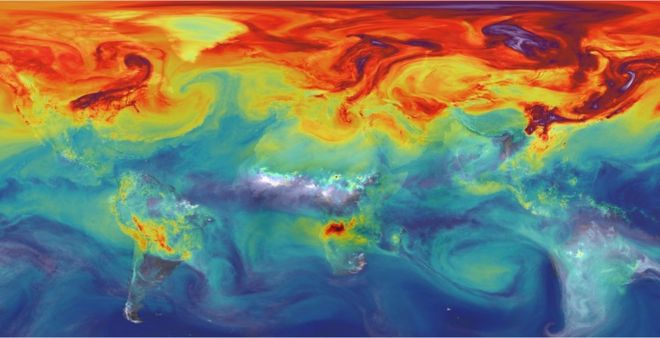All in dumbasses - Europe's new space budget to en
Post# of 129093

< >

Europe will press ahead with a network of satellites to track carbon dioxide emissions across the globe.
They will be developed out of a new European Space Agency (Esa) budget agreed in Seville, Spain.
Research ministers on Thursday approved a package of proposals worth some €14.4bn (£12.3bn/$15.9bn) over the next five years.
As well as the new CO2 monitoring system, the funds will also pave the way for missions to the Moon and Mars.
"You're looking at a very happy DG," said Jan Wörner, the director general of Esa, after getting pretty much everything he wanted from the "Space19+" Ministerial Council. "It always looks so simple. But it took more than two years of preparations to get here. Unbelievable!"
While there were multiple projects being considered here, it is the support given to Earth observation (EO) that catches the eye.
Delegates from 22 nations had been asked to pledge €1.4bn (£1.2bn) to expand the so-called Copernicus programme, which flies a suite of Sentinel satellites to track the health of the planet. At the end of two days of discussions, the actual figure committed was €1.8bn (£1.5bn).
The extra cash will enable Esa to improve the performance of the new Sentinels.
The three spacecraft that will make up the carbon dioxide constellation will have their resolution increased, to be able to map grid squares across the globe of just 2km across. And their swath - the width of their vision - will be increased from 200km to nearly 300km. In addition, the satellites will be given more instruments to help tease apart the CO2 coming from natural sources from that which is being produced by humans.
The enhanced capability is expected to be a potent tool in helping all nations - not just European ones - better understand their carbon footprint.
Esa wants to get the new Sentinel system launched by 2025/26, to align its mapping service with the global stocktake of emissions that will be undertaken in 2028 as part of the Paris climate deal.
As well as CO2-sensing satellites, the expanded Copernicus programme will develop five other systems to measure a range of Earth variables, from the extent of Arctic sea-ice to the temperature of the global land surface.
The impressive backing for these new Earth observing spacecraft was driven largely by Germany, which pledged €518m (£444m) of the total €1.8bn. Its industry will now get the bulk of the R&D contracts.
"Earth observation is the cornerstone of German space policy," said Thomas Jarzombek, from the nation's Economic Affairs Ministry.
"People are more and more interested in climate change and what we can do to protect ourselves against it. Information is key because we can only really act against climate change if we understand what it going on. Copernicus gives us better data," he told BBC News.
It should be stated that Copernicus is a joint venture between Esa and the EU, with the latter covering 70% of the overall costs. Brussels' contribution to the expansion programme has yet to be determined.
"There is today about €6bn (£5.1bn) foreseen as part of the [EU] budget for space. And we look forward to completing the constellation with the recurring [satellites] which are to be paid for by the EU along with, of course, their operation," explained Esa EO director, Josef Aschbacher.
Across the entire Space19+ budget request, the top contributing countries were:
Germany - €3.3bn (£2.8bn), which is a 23% share of the total budget
France - €2.7bn (£2.3bn), which is an 18.5% share
Italy - €2.3bn (£1.8bn), which is 16%
UK - €1.6bn (£1.4bn), which is 11.5%
The UK's subscription after this meeting will rise from €355m (£304m) per year to €440m (£377m) per year.
Graham Peters, the chair of the trade association UKSpace sees this as a positive outcome.
"It gives us a fantastic platform upon which we can now build the national space programme to develop new sovereign capabilities and to start collaborating more globally to drive exports," he said.
 (0)
(0) (0)
(0)